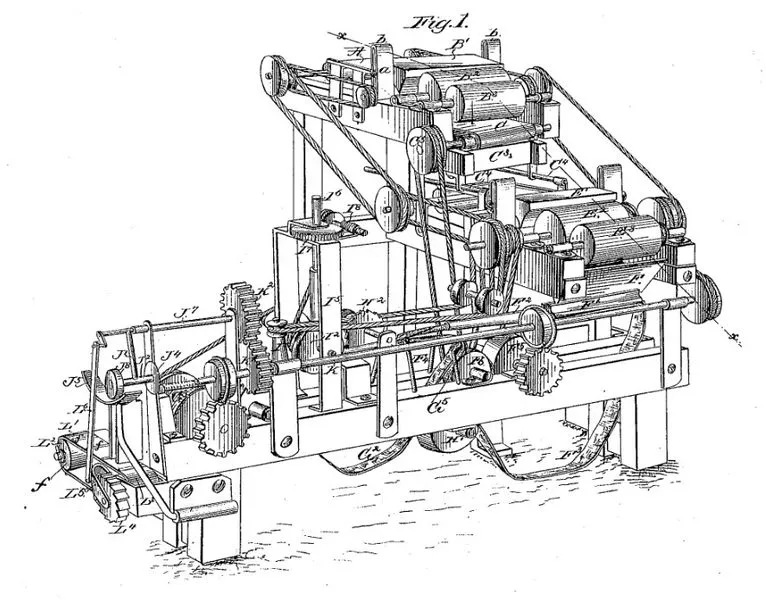I am fascinated by decision making. In safety management there are so many examples how some seemingly trivial decisions lead to huge disasters later on.

Source
Often, the same applies to people’s lives, decisions that seemed safe at the time can have a disastrous impact on the course of your life in the medium to long run. I am not even talking about the safety related stuff like texting at the wheel, eating the wrong food or trusting your hard earned money to the wrong investment vehicle.
What I am talking about are decisions that are so taken for granted, based on assumptions that most people don’t even question.
We all try to navigate life in this world by making decisions, big and small, based on assumptions on how things work.
The problem is that most of those assumptions are not true anymore and the decisions we made as a result might not generate the expected results anymore.
Since a few years, one of the things that I started looking into is systems thinking which helped me understand many things about complexity.
It turns out that there are many lessons to be learned in complex models that are universally useful. Because in the end, life and society are complex.
Without knowing it, the mental model you hold might be based on a complicated view of the world.
In this article I want to explain why thinking about life as complex might be more useful to you.
Looking at your life as a machine: the complicated world view
To make sense of the world, most people try to reduce the world they live in to some thing manageable.
Most mental models of the world turn out to look like a machine.

Source
We like machines, they are nice and predictable.
One thing goes in, stuff happens and another thing is generated by the machine as a result.
Machines have many different parts but they interact in a known and linear way.
Machines have one optimal way of operation.
There are few surprises with machines. Generally they happen when you deviate from the one "best" operation method.
Yes they can break down, but are fairly straightforward to fix.
Find the part that broke and replace it, et voilá, the machine works again.
This is what you could call the complicated systems view of life.
This view of the world reduced to a mechanistic model is comforting.
It gives the illusion that things are linear and predictable… It suggests that no matter how complicated life gets,
you can repeat the same formula and expect the same outcome.
The result: the standard operating instruction manual
This complicated mental model shapes our worldview and decision making, it suggests that to operate successfully in life we simply have to follow the instructions in the operations manual:
For the past 50 or so years this model has lead to a few standard formulas to “win” at life…
- As a kid, you have to go to (primary and high) school, get good grades.
- After school, go to college: college teaches what a professional needs to know. Get a degree it will get you a good job!
- After college, If you get a "good job"". Start climbing that corporate ladder!
- Then, with a "good job", and hence "steady" income it is time to "invest" in real estate.
- After working 35-40 years you get to “enjoy” retirement… all that money you put into your pension fund will give you a comfortable life.
I´m sure you have observed by now that more than a few of these assumptions about how life should work actually are less and less true.
Complex systems
Complex systems also have many components, but these are constantly and dynamically changing and interacting.
A better mental model is to compare it to an ecological system like a jungle.

Source
Everything is connected and constantly changing. Small changes in inputs like a few degrees more or less temperature might seem trivial but can start a chain reaction that impacts every aspect of the system.
Another very important property of complex systems is that they have non-linear behaviour.
There is not necessarily a proportional or predictable link between input and output.
I found a great explanation here:
http://learningforsustainability.net/post/complicated-complex/
Systems can be usefully seen as lying along a broad continuum from ‘simple’ to ‘complicated’ to ‘complex’.
Simple problems (such as following a recipe or protocol), may encompass some basic issues of technique and terminology, but once these are mastered, following the ‘recipe’ carries with it a very high assurance of success.
Complicated problems (like sending a rocket to the moon), are different. Their complicated nature is often related not only to the scale of the problem, but also to their increased requirements around coordination or specialized expertise. However, rockets are similar to each other and because of this following one success there can be a relatively high degree of certainty of outcome repetition.
In contrast complex systems are based on relationships, and their properties of self-organisation, interconnections and evolution. The metaphor that Glouberman and Zimmerman use for complex systems is like raising a child. Formula have limited application. Raising one child provides experience but no assurance of success with the next. Expertise can contribute but is neither necessary nor sufficient to assure success. Every child is unique and must be understood as an individual. A number of interventions can be expected to fail as a matter of course. Uncertainty of the outcome remains. The most useful solutions usually emerge from discussions within the wider family and involve values.
Socio technical complex systems
In modern human systems there are two factors that make complex systems more complex than those found in nature:
The human capacity to collaborate has been the key factor to our success as a species. But the reactions and interactions are very difficult to predict and understand completely.
Those who are playing the stock market have probably found out the hard way... there is no logic in social interaction, only broad tendencies which can unpredictably change. Small input changes, say like a few interest points change on loans, can have unpredictably huge changes.
The other unique factor in human created complex systems is technology. As I write in other articles, technology is improving on an exponential curve. This will in turn create unpredictable exponential changes in our society and life.
The result of technology is that change itself accelerates too at all levels of complex systems.
Some examples of socio-technical systems: social networks like Youtube, traffic in your city, job markets, stock markets, the economy, your household, ...
How to navigate a complex world
Recognizing that your life is complex and not merely complicated enables you to play by this new set of rules:
These new rules by the way are equally useful to navigate life in Steemit.com which is an example of a complex socio-technical system itself
From http://learningforsustainability.net/post/complicated-complex/ emphasis is mine
As Irene Ng points out in her Complicated vs Complex Outcomes post we have spent the last 100 years doing complicated rather well. “We can pat our backs on putting the man on the moon, doing brain surgeries etc.”
We are now moving to a world where learning and innovation are becoming key outcomes, and delivering these requires new skills and capacities. As Irene Ng so eloquently puts it, “We can determine complicated outcomes. We can only enable complex outcomes. We can specify complicated systems. We can only intervene in complex systems.”
- Complicated systems
Role defining – setting job and task descriptions
Decision making – find the ‘best’ choice
Tight structuring – use chain of command and prioritise or limit simple actions
Knowing – decide and tell others what to do
Staying the course – align and maintain focus
- Complex adaptive systems
Relationship building – working with patterns of interaction
Sense making – collective interpretation
Loose coupling – support communities of practice and add more degrees of freedom
Learning – act/learn/plan at the same time
Notice emergent directions – building on what works
Challenge assumptions : there is no one ‘best’ choice anymore
From the above rules you can see that the focus in complex systems shifts to a more fluid set of rules.
I write about this in this article
Where complicated systems allow for a rigid formula, a complex system require to observe interactions and tendencies and more of a go-with-the-flow approach.
There are no one-size-fits all formulas anymore that will guarantee a positive outcome for everyone. You need to optimise your decision making for what is optimal for you, not the masses. Your risk/opportunity profile is completely different depending on your knowledge, environment, skillset, leverage opportunities and access.
To avoid getting suckered into decisions which can destroy your life in the medium to long term, you must be able to challenge assumptions and be ready to question all the "common sense" advice you receive.
"Go to college = get a "good" job! "
Is there a reasonable chance of return on investment? Can I expect to pay off the debt?
Do I need the degree or can I obtain other qualifications which also guarantee me a job? (See http://profoundlydisconnected.com/scholarship/ or https://www.udacity.com/nanodegree)
"A house is an investment." Really?
"Working for a big company provides opportunities for career advancement." Really?
"Retirement after working 40 years" Riiiighttt
Knowing: No rigid scripts for success in complex systems
You can't have absolute certainty anymore.
To demonstrate this: look at the phenomenon of a viral hit on youtube. It is a great example of the non-linear behaviour of the complex socio technical system that is youtube. There are no set formulas to make a viral video.
Many people try but there are too many elements which can make or break it. What many creators of viral hits do have in common is that they are constantly experimenting with what works.
Complex systems require much more experimentation to find out what works, and then build on it. You can't take preconceived assumptions and bet that they still work.
Recently there was a great post by @kyriacos discussing how most books about how to become a millionaire are bullshit
Event the billionaires themselves can't follow the same recipe again and expect to be billionaires all over...
The expiry date of knowledge is getting shorter and shorter. Individuals who are not willing to critically examine what they "know" on a regular basis sooner or later start to tell others what to do on the basis of outdated knowledge...
Loose coupling : feedback loops
In a fast moving world you need to look for or design short feedback loops to find out what works.
They give you quick information to see what works or not.
An example of a long feedback loop is studying for 4 years and then trying to find a job.
A shorter feedback loop would be try to find a job first, see what is in demand and learn these skills as fast and cheaply as possible in a few months rather than years.
Learning constantly is the new normal, because everything is constantly changing, old knowledge is less likely to remain useful.
This is especially important to look out for in the organisations you work for.
If your company has very tight structure and strict "command and control" approach which does not allow freedom of initiative and experimentation at lower levels, the probability of this company existing for much longer is NOT going to be very high... A company which does not allow experimentation or deviation to find out how to improve continuously will fall behind quickly.
Look for leverage points
As I explained in my article about leverage in a world which is increasingly non-linear there are also many opportunities to get disproportionate rewards for your efforts.
Leverage is about finding ways to obtain a multiplier effect.
If you are aware of opportunities that give you leverage, you can improve your results many-fold without much extra effort.

This post is part of my JULY EXPERIMENT: I share ALL SBD's earned from this post with:
1 quality commenter
1 Re-steemer (that gives me a good reason why they are re-steeming)
What else am I missing with this article, agree? Don’t agree?
I would love to have your comment, maybe you can win some decent money. Anything thought provoking is great. Disagree, fantastic! Let me know! Have a question? Even better, a great question is sometimes better than a page long comment!
So please comment, question, challenge and RESTEEM to get as many people in the conversation as possible.
